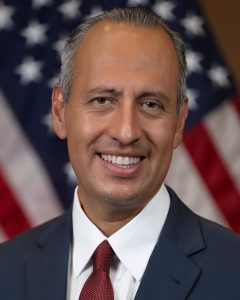|
Only have a minute? Listen instead
Getting your Trinity Audio player ready...
|

EDINBURG — Staunch public outcry prompted the city council here to kill a proposal that would have allowed voters to choose whether they wanted to extend term limits for elected officials by an additional four years.
Currently, members of the council are limited to serving a total of eight years over the course of two four-year terms.
However, a councilmember who has termed out can serve an additional two-term tenure as mayor, or vice-versa — a termed out mayor who has not previously served as a councilmember may run for and serve on of those four seats for two terms.
But a new proposal — one of 13 suggested updates to the Edinburg City Charter — would have given officials the opportunity to run for a third term.
The proposal, dubbed “Proposition A,” would have also added clarifying language that a candidate may not attempt to jump from at-large council seat to at-large council seat in an effort to circumvent the term limits.
But some residents balked at Prop A, saying the amendment would be a slap in the face to voters who already made their intentions clear in 2018.
“The president of the United States only gets eight years. If they can’t take care of it … then you should not have any more time,” Edinburg resident Fern McClaugherty said during the public comments portion of last week’s council meeting.
A member of the citizen watchdog group, the OWLS, or Objective Watchers of the Legal System, McClaugherty reminded the council that the city had already put the issue to a vote six years ago.
And if her assertions didn’t jog their memories, then the several residents McCLaugherty had brought to the meeting with her just might.
“I have people … that are here, took off from their time that they should be at home, to come and tell y’all they do not want you to put an election up. They already voted twice,” McCalugherty said.
“So, if you do this, I’m hoping that each one (of them) in this room will contact their friends, relatives and loved ones to vote you out of office,” she added a moment later.
McClaugherty was referring to a charter amendment election the city held in 2018.
During that election, Edinburg voters overwhelmingly voted to reduce elected officials’ terms from three to two.
Proposition B passed by a 2-to-1 margin, with 11,376 votes in favor and 6,410 against, according to Hidalgo County elections records.
“I want y’all to do the right thing. Can you not answer to the public? And which one of y’all decided this was such a wonderful deal?” McClaugherty asked the council last Tuesday.
Edinburg Mayor Ramiro Garza Jr. responded.

The mayor has long since gone on record opposing any extensions to the city’s eight-year limit.
Garza said that it wasn’t the five men on the city council that came up with the 13-odd charter amendment proposals. Rather, it was a five-member ad hoc committee of everyday Edinburg residents who came up with the list of propositions.
“None of these were put in by the council. The charter review committee reviewed all the charter with our city attorney, city secretary. And they came up with these suggested changes that they wanted to bring us,” Garza said.
The mayor also reminded McClaugherty and other residents that even if the council approved of leaving Prop A in the charter amendment election, the voters would be the ones deciding its ultimate fate.
All five councilmen spoke against extending term limits, though one expressed concern over killing Prop A outright.
“Right now, the current charter says you can flip from one (seat) to another,” Place 3 Councilman David Salazar Jr. said.
Edinburg City Attorney Omar Ochoa said such a reading of the charter language is a matter of interpretation.
Ultimately, when Garza called for a motion on the matter, the vote was unanimous: Prop A was dead.
But the council wasn’t done there. A few moments later, they voted to kill another suggested amendment: Proposition K.
That proposition would have allowed voters to decide whether they wanted to give the city council the authority to appoint “associate” municipal judges that could serve in conjunction with the elected municipal judge, or in his absence.
Currently, the city can make use of “visiting” judges, which may only serve in the elected municipal judge’s absence from the court, Ochoa said.
Place 4 Councilman David White motioned to approve including Prop K on the November ballot, but his motion died due to a lack of a second.
White was critical of the current judge, Hector Bustos Jr., whom the council originally appointed to serve in the position after former municipal judge Toribio “Terry” Palacios stepped down to run for district attorney.
Voters subsequently reaffirmed that appointment when they chose him over challenger Armando Guerra in the November 2023 election.
But since then, Bustos’ attendance at the municipal court has been unreliable, forcing the city to rely on the services of judges from other cities.
“Right now, you’re paying a guy $90,000 a year and we’ve appointed a bunch of visiting judges to come do the work,” White said, with an audible note of frustration.
Taking a more measured tone, Place 1 Councilman Dan Diaz noted that the city’s growing population could benefit from being able to have more than one judge at a time on the clock.
“We’re over 100,000. We do need another judge. We need coverage in the morning and afternoon, not just in the afternoon,” Diaz said.
White continued to press, saying Bustos’ absences have affected the police department, as well as residents who are unable to plead their cases before him.
“I’ve tried to sit down with the judge,” White said, explaining he had hoped to help troubleshoot any issues.
“And he’s stood me up three times,” he said.
At the conclusion of the lengthy discussion, the council — save White — voted to kill Prop K, meaning the city will continue to only be able to use volunteer judges when Bustos is not present.
The remaining 11 propositions head to the ballot in November.



